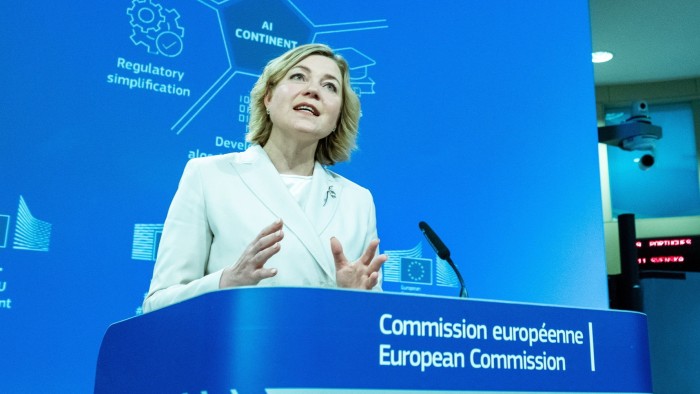Good morning. If Russia attacked Nato, would the continent’s crumbling bridges, mismatched rail tracks and border bureaucracy prevent troops, tanks and other reinforcements from across the Atlantic reaching the front line in time? Our visual investigation takes you through the onerous 45-day military journey across Europe.
Today, our Berlin bureau chief previews a joint Franco-German effort to swing behind a pan-European tech strategy, and our Rome bureau chief reports on Italy’s move to redouble efforts to support Ukraine.
Forecasting the World in 2026: Join senior FT editors on December 3 for a live discussion exploring the forces shaping the year ahead, from political realignments and economic change to technology’s growing influence on global power.
Tech teamwork
Will Europe’s largest economies unite to try to close the artificial intelligence gap with China and the US? Under German Chancellor Friedrich Merz and French President Emmanuel Macron, the EU has never been closer to genuine Franco-German tech alignment, writes Anne-Sylvaine Chassany.
Context: The two leaders are hosting a joint summit on EU digital sovereignty in Berlin today, designed to jump-start AI projects across sectors ranging from cloud computing and medical research to defence technology.
At stake is Europe’s ability to reduce its dependence on US cloud service providers — which supply more than half of all cloud services in Europe — curb its reliance on Chinese digital infrastructure, and foster a more innovation-friendly environment at home.
While the notion of “sovereignty” has long been a French rallying cry, it is a more recent concern in Berlin.
After his election victory in February, Merz, a staunch Atlanticist, surprised many by declaring that Europe must “achieve independence from the US”. His culture minister has also signalled support for a digital levy on US platforms as a matter of “fairness”.
Last week, the chancellor confirmed that his government aimed, when feasible, to replace all components made by Chinese manufacturer Huawei in telecommunications networks.
“It’s very important that two of our biggest member states are very committed to technological sovereignty and they also want to push this forward,” Henna Virkkunen, the EU’s tech chief who will represent the European Commission at the event, told the Financial Times. “If we look at our tech companies, it’s really important for them that our member states are buying services from European Union companies.”
Paris and Berlin want to scale back some EU regulation of AI, rules that many start-ups including France’s Mistral have criticised as overly stringent. Mistral, Europe’s most promising AI player, is expected to announce deals today with German groups in an effort to showcase Franco-German co-operation.
Both countries are also expected to embrace a “Buy European” approach in public procurement, a key demand of European tech groups, which are also urging the commission to foster the emergence of large players through mergers and acquisitions.
“Our ambition is for public and private entities in Europe to rely on credible, competitive, and trusted technological alternatives developed within our own digital ecosystems,” a coalition of a dozen tech trade associations wrote in a joint statement.
Chart du jour: Big guns
Several big European defence companies are preparing to float on public markets, seeking to capitalise on investor enthusiasm.
Doubling down
Italy’s top strategic body has “reaffirmed . . . full support for Ukraine in defending its freedom”, and pledged a fresh package of military aid that it said “fits this purpose”, writes Amy Kazmin.
Context: Prime Minister Giorgia Meloni’s three-party coalition has been riven by deepening internal tensions over support for Ukraine and its pledge to Nato to increase defence spending to 5 per cent of GDP.
While Meloni staunchly backs Kyiv, her deputy prime minister Matteo Salvini — leader of the League, and a longtime admirer of Russian President Vladimir Putin — has publicly questioned the merits of supporting Ukraine, particularly given the recent corruption scandal involving some of President Volodymyr Zelenskyy’s allies.
These tensions have erupted into full public view as Italy prepares to send Kyiv a 12th package of military aid, which reportedly include munitions, missiles and power generators, though the details remain confidential.
During a meeting yesterday evening, the country’s Supreme Defence Council, which is chaired by President Sergio Mattarella and includes Meloni, senior ministers and the country’s military chief, reiterated that participating in EU and Nato initiatives to support Ukraine “remain essential.”
The council also sounded the alarm about “the hybrid threat coming from Russia and other hostile foreign actors” in Italy and Europe, including the risks posed by cyber attacks, disinformation campaigns, interference in democratic processes, and “the exploitation of digital platforms to undermine trust in institutions and social cohesion”.
“These threats represent a challenge that requires a timely and capable response, including the development of new tools,” Mattarella’s office said.
What to watch today
-
Spain’s Prime Minister Pedro Sánchez hosts Ukraine’s President Volodymyr Zelenskyy in Madrid.
-
Nato secretary-general Mark Rutte meets Slovak Prime Minister Robert Fico in Bratislava.
Now read these
Are you enjoying Europe Express? Sign up here to have it delivered straight to your inbox every workday at 7am CET and on Saturdays at noon CET. Do tell us what you think, we love to hear from you: europe.express@ft.com. Keep up with the latest European stories @FT Europe




